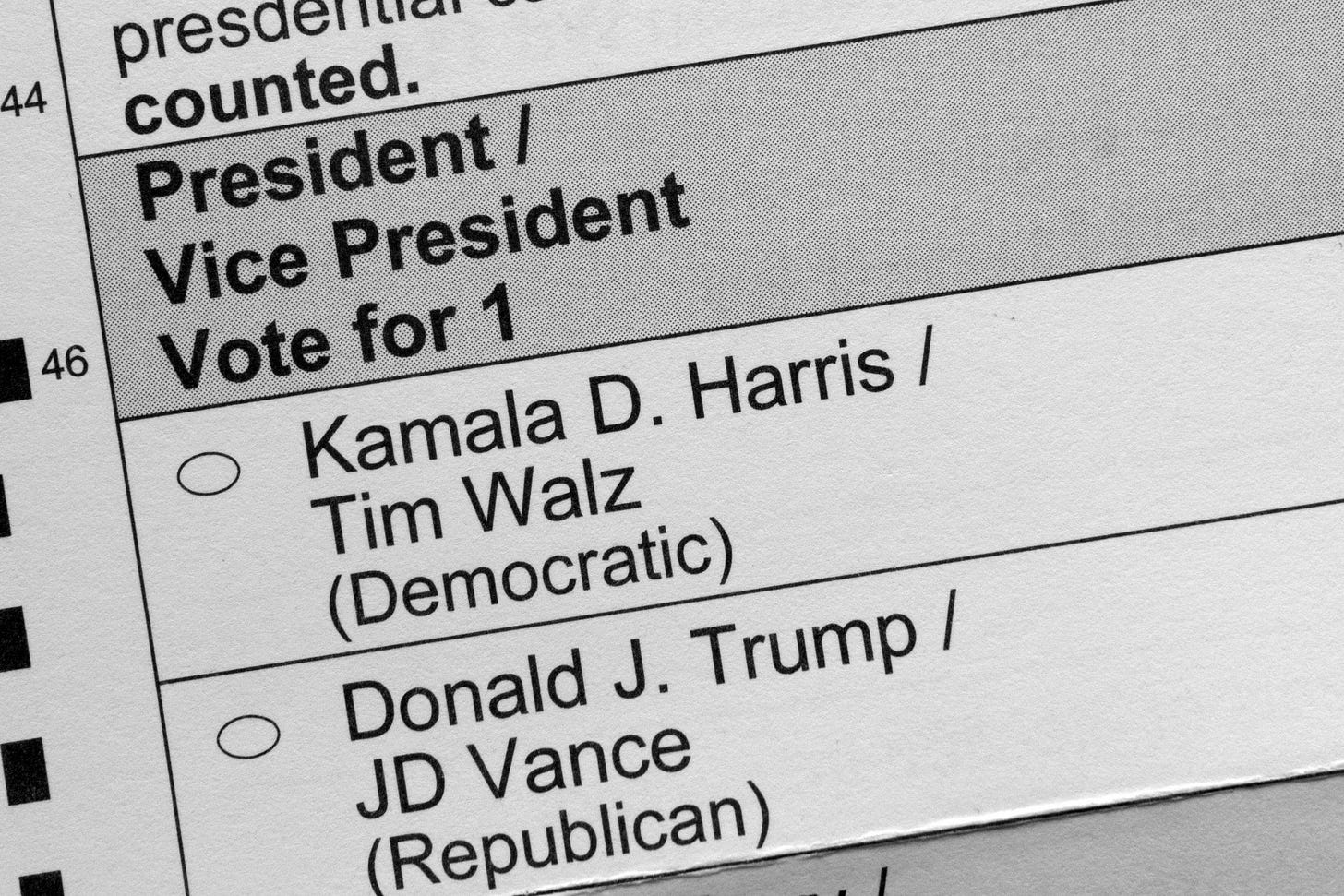Bullet ballots, body counts, and the stakes of disinformation
With enough followers, anybody can be an expert.
If you’re looking to get away from family or football over the Thanksgiving weekend, take a listen to my conversation with Nathaniel Pearlman, founder of the Democratic fundraising software NGP, on his podcast The Great Battlefield. We had a great chat. I hope you enjoy it.
Despite what too many people are spreading on social media, Donald Trump won the election and there’s nothing nefarious about his victory, even if it’s distressing. I’ve had numerous people write to me about Trump stealing the election. I’ve also seen a bunch of posts about supposedly suspicious activity, especially something called “bullet ballots.”
Apparently, “bullet ballots” occur when a voter only votes for the top of the ticket without voting for other races. The theory goes that too many people only cast votes for Donald Trump and didn’t vote for other races down the ballot. Somehow that’s become suspicious.
I’ve been working in politics for more than thirty years and I’ve never heard about “bullet ballots,” but I have heard about ballot drop-off. In almost every down-ballot race on which I’ve ever worked, we’ve urged voters to vote all the way down the ballot, not just the top of the ticket. In fact, there are whole programs designed to encourage voters to vote beyond the top of the ticket.
In mid-term elections, turnout is usually 15-20 percent lower than in presidential years. Those extra voters come to vote for the president and often skip the rest of the ballot. As political scientist Chris Cooper at Old North State Politics wrote, ballot drop-off, or roll-off as he calls it, was normal in North Carolina this cycle.
The rumors highlight the whole trend of dubious experts on social media. People who have limited knowledge of how campaigns or elections work claim to be experts, often citing experience that they consider related. They construe misguided opinions or outright misinformation as statements of fact. In the case of the bullet ballots, I kept seeing some guy named Spoonamore cited on Blue Sky and Twitter like he was an expert. I couldn’t find anything about him that indicated in-depth knowledge of elections, but, for too many people, he became an authority.
We saw the same phenomenon during the Helene recovery. Rumors were started by self-proclaimed experts that had devastating consequences. Some group called the Western Carolina Emergency Network spread false information about the number of people killed during the disaster. According a story by Blue Ridge Public Radio, the group received more than $150,000 in donations to a GoFundMe account. A review of emails indicates that they knew they were spreading misinformation but were excited by their stories (lies?) “going viral.” Millions of people saw their misleading posts.
The whole charade continues today. On Twitter, various people are establishing themselves as experts on disaster relief, constantly criticizing the response of FEMA and other government agencies. One guy with almost 40,000 followers is quoting convicted liar and noted grifter James O’Keefe and making statements with few citations to blast the on-going effort. In one post he declares, “WE ARE THE MEDIA NOW!” Anybody can be a journalist.
He’s just one of numerous posters spreading thinly sourced or unsourced information. The common theme is outrage. They are all angry at the government, blaming them for everything from a slow response to lying about the death toll. In their telling of disaster relief, it’s driven by local heroes who defy the incompetence of the government. It makes for compelling reading, but it’s not based in reality.
All these self-proclaimed media types have conveniently ignored the Republicans in the North Carolina legislature cynically using the disaster relief bill as partisan power grab. Their outrage seems limited to forces they already distrusted. While none of them seem to have any background in disaster relief, they are suddenly experts and their tens of thousands of followers share their information as if it’s definitive.
I fear that they actually are the media now for too many people. Anybody can be an authority on anything if they just have enough followers. Often the goal is just to spread outrage and anger, never look for solutions. The federal government might be sending at least $13 billion to the state, a figure most people can barely comprehend, but that’s either not enough or it’s already been wasted, according to these self-styled reporters on Twitter.
The media is shifting dramatically. We’re going to have to re-establish trusted sources of information. The legacy media is suffering a crisis in credibility and social media is a source of disinformation. People increasingly look for information that confirms their world view instead of seeking information that’s accurate. Somehow, we need to find a common source of truth if we are going to become a cohesive society again.



Stealing the election is what Republican Jefferson Griffin is trying to do for the NC Supreme Court seat. He wants to eliminate 60,000 votes because they voted for Allison Riggs. As usual, it's the Republicans who won't respect the law, who steal ballots (happened a few years ago) and votes. I just read that Senate leader Phil Berger told reporters that this year’s post-election vote counting process is “another episode of ‘count until somebody you want to win, wins,’”.
Thanks, Thomas, for calling out the distracting voices. I always heard an expert was someone who was 20 miles from home...............BWTFDIK? I am hearing about a lot of Trump voters who don't understand how it all works (like a guy from Virginia asking if he can vote in a neighboring small town here during early voting. Where do these people come from? Or where have they been when they should have been learning these basics 30 years ago????